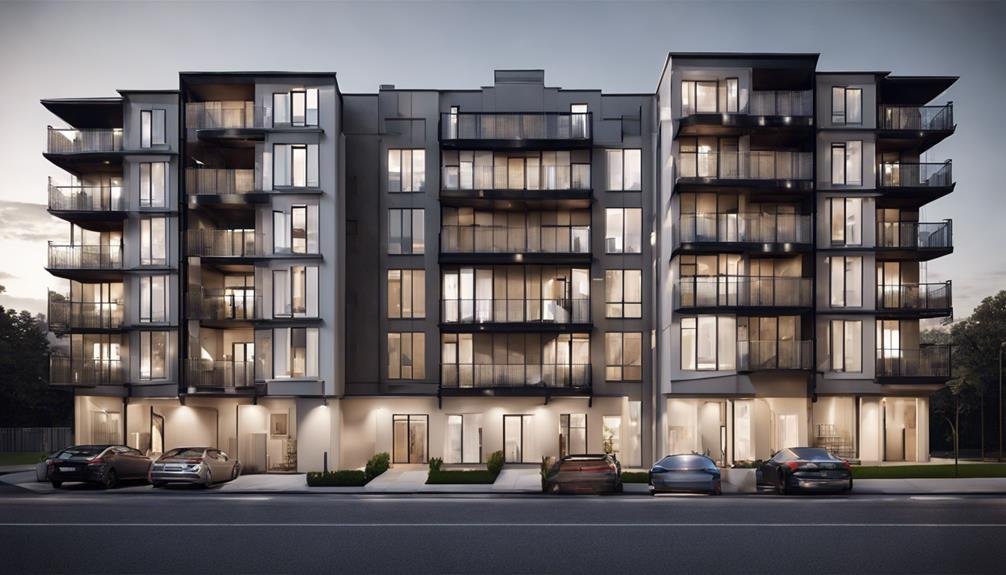What Is a Condominium? How Condos Work Compared to Apartments
Condominiums, or condos, combine individual ownership with shared communal living under a condo association's management. Exclusive ownership of units and shared common areas highlight condo living. Owners elect a board for decision-making and upkeep, essential for property value. Condos vary from high-rises with amenities to cozy townhouse communities, catering to diverse lifestyles. Parking arrangements can offer exclusive spaces or shared lots. In contrast to apartments, condos provide ownership benefits and potential appreciation. Financially, condo fees cover amenities and maintenance, requiring budget management and understanding of fee structures. Explore further to understand the nuances and benefits of condo living.
Key Takeaways
- Condos offer ownership of units and shared areas, while apartments are rented.
- Association fees in condos provide ownership benefits and shared amenities.
- Condos offer more control and potential property appreciation compared to apartments.
- Lifestyle differences between condos and apartments cater to varying preferences.
- Condos involve financial aspects like maintenance fees and reserve funds for stability.
Ownership Structure and Management
In analyzing the ownership structure and management of condominiums, it becomes evident that the distinct characteristics of individual ownership within a communal setting overseen by a condo association shape the operational framework of these residential properties.
Unit allocation in condominiums involves the exclusive ownership of a specific living space while sharing common areas with other unit owners. Board governance plays a vital role in decision-making processes, financial management, and enforcing regulations within the condo community.
The board, typically elected by unit owners, oversees property maintenance, resolves disputes, and guarantees adherence to bylaws. Effective board governance is essential for maintaining property values, fostering a sense of community, and addressing the diverse needs of condominium residents.
Types of Condominiums
Differentiating the various types of condominiums provides valuable insight into the diverse residential offerings within the real estate market. High-rise living and townhouse communities are two common types of condominiums that cater to different preferences.
High-rise condominiums offer residents the allure of living in a tall building with expansive views, often providing amenities like gyms, pools, and concierge services.
On the other hand, townhouse communities offer a more suburban feel, with units typically arranged side by side and sometimes stacked, providing a sense of a closer-knit neighborhood.
Understanding these distinctions allows potential buyers to choose a condominium type that suits their lifestyle and preferences, whether they prefer the vertical living of high rises or the neighborly feel of a townhouse community.
Parking Ownership Considerations
Considerations surrounding ownership of parking spaces in condominium developments play an essential role in defining the property rights and responsibilities of unit owners. Understanding the nuances of parking ownership in condos involves various critical factors:
- Exclusive Rights: Some condo unit owners may have exclusive rights to specific parking spaces, granting them sole use and control.
- Parking Regulations: Condo associations often establish parking regulations to guarantee fair allocation and usage of parking spaces within the development.
- Assigned Parking: In some cases, parking spaces are assigned to unit owners, ensuring they have a designated spot for their vehicles.
- Shared Parking: Certain condo developments may have shared parking areas where unit owners do not have exclusive rights to specific spaces but can use any available spot within the shared parking facilities.
Contrasting Condos and Apartments
When comparing condominiums and apartments, the fundamental distinction lies in their ownership structure and residents' rights. Condominiums offer ownership of individual units within a complex, providing residents with a stake in common areas through association fees. In contrast, apartments are typically rented from a single entity, offering less control over the property and limited involvement in decision-making processes.
Pros of condos include ownership benefits, shared amenities, and potential for property appreciation. However, cons may involve higher upfront costs, association fees, and restrictions on property modifications. Lifestyle differences between condos and apartments also exist, with condos appealing to those seeking a sense of community and shared responsibility, while apartments may suit individuals looking for flexibility and minimal maintenance obligations.
Financial Aspects and Maintenance Fees
Exploring the financial implications and maintenance fees associated with condominium ownership provides valuable insights into the overall cost considerations for prospective buyers. When delving into the financial aspects of owning a condo, several key points should be taken into account:
- Budget management: Understanding the breakdown of condo fees and how they contribute to the overall financial health of the association.
- Cost sharing: Recognizing the benefits of sharing costs for common amenities and maintenance, which can lead to more affordable living arrangements.
- Fee structures: Examining the different fee structures in place, such as monthly maintenance fees, special assessments, and how they impact the budget.
- Reserve funds: Evaluating the significance of reserve funds for future repairs and maintenance to sustain the long-term financial stability of the condominium association.
Conclusion
To sum up, the intricate ownership structure, management dynamics, and financial considerations of condominium living set it apart from traditional apartment arrangements. With shared responsibilities and a sense of community, condominiums offer a unique blend of privacy and communal living.
As readers reflect on the distinctions between condos and apartments, one may wonder: how does the balance between individual ownership and collective governance enhance the overall living experience in a condominium?







